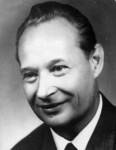 Alexander Dubcek (1921-1992) was a Czechoslovakian political leader, famous for overseeing the short-lived Prague Spring. Dubcek was the son of a Slovakian cabinetmaker who immigrated to Chicago in 1911. The family returned to the newly formed Czechoslovakia a few weeks before Dubcek’s birth. The young Dubcek became a factory worker and joined communist groups. He was also active in the anti-Nazi resistance during World War II, fighting in an August 1944 uprising that killed his brother. After the war, Dubcek graduated in law and began to ascend through the ranks of the Czechoslovakian Communist Party. By the early 1960s he had become a significant communist leader, sitting on the Central Committee and Presidium. After a series of power struggles, Dubcek became party leader in his native Slovakia (1963).
Alexander Dubcek (1921-1992) was a Czechoslovakian political leader, famous for overseeing the short-lived Prague Spring. Dubcek was the son of a Slovakian cabinetmaker who immigrated to Chicago in 1911. The family returned to the newly formed Czechoslovakia a few weeks before Dubcek’s birth. The young Dubcek became a factory worker and joined communist groups. He was also active in the anti-Nazi resistance during World War II, fighting in an August 1944 uprising that killed his brother. After the war, Dubcek graduated in law and began to ascend through the ranks of the Czechoslovakian Communist Party. By the early 1960s he had become a significant communist leader, sitting on the Central Committee and Presidium. After a series of power struggles, Dubcek became party leader in his native Slovakia (1963).
In the mid-1960s Dubcek and his followers caused divisions in party ranks by advocating liberal reforms to Czechoslovakia’s stagnating economy. In January 1968 Dubcek emerged as the leader of the now factionalised Communist Party, and therefore the nation. He promised to create “socialism with a human face” with a measured program of political liberalisation and economic reforms. His first changes were to allow greater press freedom and to rehabilitate victims of Stalinism. In April 1968 his government unveiled a reform manifesto titled “Czechoslovakia’s Road to Socialism”. Dubcek’s aim was not to erode or undermine communism but to strengthen it by attracting public support. He assured Soviet leaders of this in July 1968, promising a commitment to both socialism and the Warsaw Pact.
Dubcek’s assurances did not satisfy communist hardliners. Nervous that liberalisation might spread to other Soviet bloc nations, Moscow decided to act. In August 1968 Warsaw Pact forces entered Czechoslovakia and ended the so-called Prague Spring. As Soviet bloc forces were dealing with non-violent resistance in Prague, Dubcek and his supporters were whisked away to Moscow. Little is known about what transpired there, however, it seems likely that Dubcek was subject to questioning and a degree of intimidation. He was returned to Prague about a week later and remained in power for several more months, though most of his reforms were wound back. Dubcek resigned the party leadership in April 1969 and by late 1970 he had been forced out of politics altogether. He spent the rest of the Cold War working a mundane job for the Slovakian civil service. Dubcek was rehabilitated and elected chairman of the Czechoslovakian assembly during the Velvet Revolution of 1989. He died in November 1992 after being injured in a car accident.
Content on this page is © Alpha History 2018-23. This content may not be republished or distributed without permission. For more information please refer to our Terms of Use.
This page was written by Jennifer Llewellyn and Steve Thompson. To reference this page, use the following citation:
J. Llewellyn & S. Thompson, “Alexander Dubcek”, Alpha History, accessed [today’s date], https://alphahistory.com/coldwar/alexander-dubcek/.
